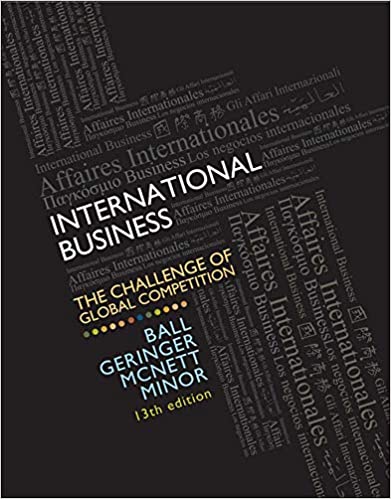
International Business 13th Edition by Donald Ball,Michael Geringer,Michael Minor ,Jeanne McNett
Edition 13ISBN: 978-0077606121
International Business 13th Edition by Donald Ball,Michael Geringer,Michael Minor ,Jeanne McNett
Edition 13ISBN: 978-0077606121 Exercise 12
Sugar Subsidies: Sweet for Producers, Not for Consumers
Although they lack comparative advantage in sugar production, the United States, Japan, and the EU, among others,
have maintained strong protection for their domestic sugar industries. A World Bank report called sugar the "most policy-distorted of all commodities." Protectionism by developed countries harms foreign sugar producers,
many of which are poor farmers in developing countries, by reducing demand and prices for their product. Oxfam
estimated, for example, that EU sugar supports had caused Malawi to experience losses that exceeded its total budget for primary health care. Before being forced by the WTO into making changes in November 2005, the EU maintained domestic sugar prices that were triple world market prices.
In the United States, sugar tariffs have been in place since 1789. Imports are allocated through tariff-rate quotas
among 40 nations and limited to about 15 percent of the U.S. market, except in years when there is a shortfall in the U.S. domestic supply, as in 2005 after Hurricane Katrina.
High price supports result in overproduction of sugar domestically, yet at the same time the price of raw sugar in the United States has averaged more than double the world price during the past decade, costing American consumers and businesses an estimated $4 billion annually. The benefits are highly concentrated among a small number of companies. A mere 1 percent of sugar growers enjoys 42 percent of the benefits from protectionist U.S. sugar policies.

Nicaraguan Jackson Riveras carries a load of freshly cut sugarcane on a plantation near Turrucares of Alajuela, Costa Rica. Like many Nicaraguan immigrants, Ramirez came to Costa Rica to work the harvest season in order to earn higher wages and send money back to his family.
Excess sugar production also contributes to environmental problems. In Florida, for example, pollution and disruption of water flows from sugar production have been cited as a major contributor to environmental degradation of the Everglades. Similar pollution concerns have been voiced in South Texas, where the annual "burn" sends burnt chaff into the sky.
Mechanization has eliminated the labor intensity of producing sugar from sugar beets or sugarcane in the
United States. Sugar is produced in 18 states and supports 146,000 American jobs, although only about 60,000 people now work directly in the production or refining of sugar.
Movement to free trade in sugar would result in an estimated loss of fewer than 2,500 workers in the sugar industry, meaning that the cost for each protected job is more than $1.5 million. In addition, protection of the U.S. sugar industry has cost thousands of jobs in other sectors, such as food and beverage manufacturing. For example, sugar accounts for 32.7 percent of the total cost of producing breakfast cereals, and high sugar prices led to the loss of an estimated 112,000 jobs at sugar-consuming companies between 1997 and 2009. High sugar prices were also
a major factor in companies' decisions to relocate operations to non-U.S. sites, especially Canada and Mexico, contributing to an increase in imports of sugar-containing products. As one Commerce Department executive said, "We are seeing U.S. jobs move to countries that don't have the competitive disadvantage of high sugar prices that we face in the United States."
Efforts to reform protection of the sugar industry have made limited progress, at least partly due to the strength of the sugar lobby. Sugar accounts for less than 1 percent of U.S. agricultural sales but an estimated 17 percent of all agricultural political contributions since 1990. "It's a very effective lobby," commented Claude Barfield of the American
Enterprise Institute. "They've traditionally given a lot of money to both parties." Sugar lobbying resulted in the complete exclusion of sugar from the U.S.-Australia free trade agreement, the first bilateral trade treaty in which the United States required that a product be entirely excluded-and a dangerous precedent.
However, change may yet occur. In 2008, the United States and Mexico finally ended their decade-long battle over access to the U.S. sugar market under NAFTA, with all barriers to trade in sugar being removed between the two countries. In 2011, legislation was introduced into the U.S. Congress to completely eliminate sugar subsidies, although the likelihood of its passage was questioned by many.
Although they lack comparative advantage in sugar production, the United States, Japan, and the EU, among others,
have maintained strong protection for their domestic sugar industries. A World Bank report called sugar the "most policy-distorted of all commodities." Protectionism by developed countries harms foreign sugar producers,
many of which are poor farmers in developing countries, by reducing demand and prices for their product. Oxfam
estimated, for example, that EU sugar supports had caused Malawi to experience losses that exceeded its total budget for primary health care. Before being forced by the WTO into making changes in November 2005, the EU maintained domestic sugar prices that were triple world market prices.
In the United States, sugar tariffs have been in place since 1789. Imports are allocated through tariff-rate quotas
among 40 nations and limited to about 15 percent of the U.S. market, except in years when there is a shortfall in the U.S. domestic supply, as in 2005 after Hurricane Katrina.
High price supports result in overproduction of sugar domestically, yet at the same time the price of raw sugar in the United States has averaged more than double the world price during the past decade, costing American consumers and businesses an estimated $4 billion annually. The benefits are highly concentrated among a small number of companies. A mere 1 percent of sugar growers enjoys 42 percent of the benefits from protectionist U.S. sugar policies.

Nicaraguan Jackson Riveras carries a load of freshly cut sugarcane on a plantation near Turrucares of Alajuela, Costa Rica. Like many Nicaraguan immigrants, Ramirez came to Costa Rica to work the harvest season in order to earn higher wages and send money back to his family.
Excess sugar production also contributes to environmental problems. In Florida, for example, pollution and disruption of water flows from sugar production have been cited as a major contributor to environmental degradation of the Everglades. Similar pollution concerns have been voiced in South Texas, where the annual "burn" sends burnt chaff into the sky.
Mechanization has eliminated the labor intensity of producing sugar from sugar beets or sugarcane in the
United States. Sugar is produced in 18 states and supports 146,000 American jobs, although only about 60,000 people now work directly in the production or refining of sugar.
Movement to free trade in sugar would result in an estimated loss of fewer than 2,500 workers in the sugar industry, meaning that the cost for each protected job is more than $1.5 million. In addition, protection of the U.S. sugar industry has cost thousands of jobs in other sectors, such as food and beverage manufacturing. For example, sugar accounts for 32.7 percent of the total cost of producing breakfast cereals, and high sugar prices led to the loss of an estimated 112,000 jobs at sugar-consuming companies between 1997 and 2009. High sugar prices were also
a major factor in companies' decisions to relocate operations to non-U.S. sites, especially Canada and Mexico, contributing to an increase in imports of sugar-containing products. As one Commerce Department executive said, "We are seeing U.S. jobs move to countries that don't have the competitive disadvantage of high sugar prices that we face in the United States."
Efforts to reform protection of the sugar industry have made limited progress, at least partly due to the strength of the sugar lobby. Sugar accounts for less than 1 percent of U.S. agricultural sales but an estimated 17 percent of all agricultural political contributions since 1990. "It's a very effective lobby," commented Claude Barfield of the American
Enterprise Institute. "They've traditionally given a lot of money to both parties." Sugar lobbying resulted in the complete exclusion of sugar from the U.S.-Australia free trade agreement, the first bilateral trade treaty in which the United States required that a product be entirely excluded-and a dangerous precedent.
However, change may yet occur. In 2008, the United States and Mexico finally ended their decade-long battle over access to the U.S. sugar market under NAFTA, with all barriers to trade in sugar being removed between the two countries. In 2011, legislation was introduced into the U.S. Congress to completely eliminate sugar subsidies, although the likelihood of its passage was questioned by many.
Explanation
Companies should be aware of the differe...
International Business 13th Edition by Donald Ball,Michael Geringer,Michael Minor ,Jeanne McNett
Why don’t you like this exercise?
Other Minimum 8 character and maximum 255 character
Character 255


